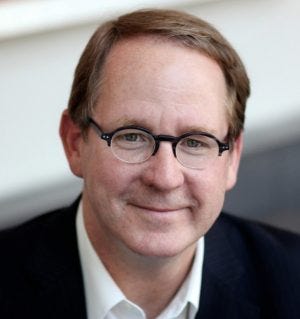Medicine Needs A Paradigm Shift - And AI Could Be The Answer
September 12, 2017


Philips are one of the world's leading health technology companies, focused on improving people's health and enabling better outcomes across the health continuum from healthy living and prevention, to diagnosis, treatment and home care. Philips leverages advanced technology and deep clinical consumer insights to deliver integrated solutions. They are a market leader in diagnostic imaging, image-guided therapy, patient monitoring and health informatics, as well as in consumer health and home care. We last spoke to them in our feature, 'How Philips is improving healthcare through AI'.
Roy Smythe, M.D. was recently appointed Chief Medical Officer of Healthcare Informatics at Philips in January 2017. He is an experienced, knowledgable clinician with decades of experience and will be sharing that expertise at the AI Summit San Francisco later this month. We are honoured to share this interview with you about the future of medicine, the augmented clinic, and the important work Philips are conducting towards a paradigm shift in patient care.
The augmented clinic
Surveys of patient attitudes towards AI carers and staff have produced ambiguous results. While most patients still feel uncomfortable with the idea of a robot replacing their doctor, the current applications of AI in healthcare are much subtler, as Philips' work demonstrates.
Just as robotic surgeons are used to support teams of doctors in operating theatres, AI will augment the work of healthcare professionals more than it will replace them. This is evident in Philips’ strategy for implementing AI into their products and services.
“Our goal is not to replace the clinician but make her more efficient and effective—to augment the clinician with actionable information,” asserts Roy. “We will increasingly use these approaches [to data] in image evaluation of all types—from MRI scanners and the cardiac catheterization lab, to handheld ultrasound devices, as well as the evaluation of images in pathology.”
“In the case of major disease conditions—such as cardiac, pulmonary, and oncology—we will be using the same approach: combining images, clinical data, demographics, and genomics to make predictions about prognosis, best treatment, and any potential complications,” Roy tells us. “This will improve care dramatically. We will increasingly be doing this not only in acute care, but also with our population health offerings—reaching ‘deeper into the triangle’ of disease severity, and using the same approaches to predict the risk for disease development, progression, and the need for acute intervention.”
“Artificial intelligence will allow clinicians to see what they may not usually see, using aggregated intelligence from billions of images that the system has ‘seen’ before; as well as the rules it already knows and will create as it sees them; and it will do so much more quickly.”
For inpatient monitoring, for example, Roy explains that Philips aim to use AI to predict events before they occur, and to notice patterns of event initiation that might be hard for a human clinician to see. It means not only monitoring patterns, but analyzing those patterns in conjunction with all other relevant data. This is being achieved through two key products—Illumeo and the IntelliSpace Portal.
Illumeo and IntelliSpace: Seeing Beyond The Data
“When making decisions about how to interpret a set of images—or choosing the best possible treatment—it can be difficult to find all the sources of information needed. Our Illumeo solution brings together the patient’s information in a way that allows the clinician to focus on what is important,” he says. For example, Illumeo allows radiologists to examine all relevant and important studies at once, or oncologists to see all the image, lab, and staging data. “This is going to become increasingly powerful as we layer in more augmented intelligence capabilities.”
Illumeo also offers what Roy refers to as “intelligent ‘shortcuts’”. These features, he argues, provide a big boost to efficiency and decisionmaking by allowing you to pull up likely images of interest, as well as provide measurements of abnormalities based on your previous actions.
IntelliSpace is parallel platform that offers advanced visual analysis and quantification by using cutting-edge machine learning capabilities to support physicians. “The latest edition of the platform (ISP 9.0) offers applications for neuroanalytics to support the evaluation of neurological disorders, such as dementia, strokes, amyotrophic lateral sclerosis (ALS), and multiple sclerosis (MS),” Roy explains. “Clinicians can monitor disease progression over time.”
IntelliSpace also offers a measurement application which gives clinicians the capability to quantify brain volume loss. Using a large comparable database that sets the ‘normal’ for each specific patient, it enables doctors to find subtle abnormalities that could indicate diseases such as Alzheimer’s.
Along with the immediate impacts these solutions are having on clinical care, Philips is also working with their healthcare provider partners on the use of AI to better understand when imaging is necessary and when it is likely to be unproductive. “In addition to improving outcomes, this will also lower the cost of delivering care,” argues Roy.
Towards smarter consumer health products
Philips aims to make their consumer health products and devices smarter and more capable of collecting accurate and useful data from individuals. What’s more, they want to use their devices to ensure patients are fulfilling the necessary tasks as part of their treatment—whether it’s through smartphone reminders to brush their teeth or take their medication—and subsequently analysing that data to provide the user with useful information.
“It’s an integral part of our strategy to use increasingly intelligent computing capabilities in our solutions,” Roy explains. “We see most of our products, services and solutions in the future supported by AI—encompassing all aspects of AI, such as big data, machine learning, and deep learning / neural networks.”
Like many other organisations, Philips hope to leverage this data on a vast scale and incorporate their insights into their long-term strategy. “In the future, this will involve looking not only at the patterns and outcomes from individual users, but from millions of them,” Roy asserts. “That means using the power of AI to recognise patterns and trends that humans can’t discern, and developing insights to provide more directed and impactful information back to consumers and care professionals in real time.”
A paradigm shift in medicine
Philips’ proposals for machine learning-assisted healthcare solutions certainly sound transformative, but what are the wider implications of AI for the way society approaches medicine and health?
“Widespread adoption of AI will create paradigm shifts everywhere,” Roy argues. He cites Thomas Kuhn, in his 1964 book, ‘The Structure of Scientific Revolutions’: “Kuhn said that paradigm shifts occur when we reach a ‘crisis’—whereby we admit that our previous way of doing things is no longer sufficient or the best choice. We know that reactive medicine is not the best way of providing care, and that we should be providing proactive care—predicting events, disease, and progression of disease, and getting ahead of those curves rather than reacting to them. Artificial Intelligence gives us these opportunities.”
What might this paradigm shift look like? In our interview, Roy uses an interesting term to refer to Philips’ aims and objectives behind their platforms—which could provide some clues as to what the shift towards proactive care might look like. “What we are working towards is tying all of these projects together into what we call the continuum of care—starting before birth and following you into your aging years and as much as is reasonable inbetween. Our goal is to create comprehensive solutions that prevent disease when it is preventable, and to lessen its impact when it is not.”
However, he goes even further, predicting that medicine will become targeted towards the individual using data from billions of patients. “Yes, AI is likely to allow for the creation of new molecules previously unimagined, and the use of drugs in ways that are more specific to the individual and his (or his disease’s) biology. Which drug is administered and which dosing schedule is required will be based on that, rather than on some sweeping generalizations based on twenty-year-old studies of a few hundred people. When you have the data on billions—and in real time—everything changes.”
Patient confidentiality and data security
If the future of medicine lies in big data, it will no doubt create new cybersecurity challenges as well as greater concerns as to data privacy. Patient confidentiality is a foundational principle of modern healthcare, and the use of patient data en masse could threaten that principle.
So, what steps are the industry taking to ensure patients’ detailed personal information is safe?
“It’s key we respect the rights of individuals to direct how their personal information is used by taking appropriate steps towards protecting it from access or use by unauthorized parties,” Roy argues. “To this end, at Philips we have built Philips HealthSuite—a secure cloud platform for advanced connected health products and services. It is built on the foundation of international standards and frameworks for integrating privacy and security into the architecture, implementation, and operation of the platform.”
Surprisingly, he believes privacy will increase as the datasets grow. “At the very start, aggregating the required data for AI training models will rely on companies being transparent about their practices and the intended use of personal information, so that individuals have the information necessary to make informed decisions of whether or not to share more information about themselves. With infomed consent, we can then build large datasets of anonymized data for AI training.”
Meanwhile, this year saw a large-scale cyberattack on the British National Health Service, and the increasing reliance of hospitals and clinics on computing solutions could compound similar threats. What are the potential risks associated with the expanded role of intelligent data platforms in the sector?
Roy admits that he is optimistic. “I think most people can imagine the various potential risks, and we are cognizant and vigilant regarding all of them at Philips. Philips is building a healthcare ecosystem with strong partners like Qualcomm Life and Amazon to ensure data is protected and the healthcare industry takes advantage of new technological advancements.”
AI will no doubt play a role in improving security and protecting against threats, Roy explains. “Of course, there’s AI that can potentially help clinicians to prevent disease months or years before its onset by noticing patterns that we can’t see. However, Artificial Intelligence is also increasingly used to monitor who accesses what information under specific conditions and to uncover patterns there. We will use AI to make data much, much safer.”
The sector’s long-term strategy
So what does the future hold for AI in healthcare and pharmaceutical technology? Roy believes that the paradigm shift he describes needs to occur before AI becomes truly useful in medicine. “We are only at the very beginning of applying AI in healthcare. In an industry where patient safety is the top priority, we need to build clinical evidence and adjust our current ways of working. We have to all agree that reactive care is sometimes avoidable, and that proactive care is better than reactive. We only spend 3% of our healthcare dollars in the US on disease prevention.”
This calls for an increase in the incentives for pharma professionals and doctors alike to focus on long-term, pro-active patient care. “The incentives have to be increasingly directed at outcomes of care, and not just the process of delivering it—unlike Uber, we get paid in healthcare if we just get you into the care, regardless of whether or not we get you to the right place or not. If I am providing care and I know that I am being incentivized—by more than just altruism—to seek the unequivocal best outcome for the patient in front of me, then I will want to leverage every tool at my disposal.
“Currently, I can’t really know what is the very best approach for the patient, but when I can leverage AI and its ability to assess millions of other similar patients and their responses, as well as my patient’s discrete biology, I will.”
Roy will be delivering a keynote speech entitled ‘AI for better health outcomes’ on behalf of Philips at this month’s AI Summit San Francisco. Looking forward to the summit, he says “I have a lot to learn, and I stand a good chance of learning from a lot of people there that know more about this than me.”

About the Author(s)
You May Also Like


.jpg?width=700&auto=webp&quality=80&disable=upscale)
.jpg?width=700&auto=webp&quality=80&disable=upscale)
.jpg?width=700&auto=webp&quality=80&disable=upscale)


.jpg?width=300&auto=webp&quality=80&disable=upscale)

.jpg?width=300&auto=webp&quality=80&disable=upscale)